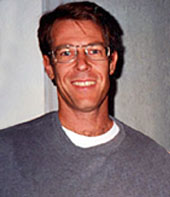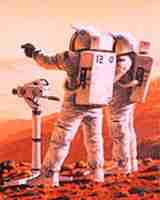|
Kim Stanley Robinson
–
science fiction author
|

|
"
...creativity and inspiration for me is not a matter of one big moment of vision
(though sometimes that can happen) but more a ceaseless application of effort to
matters of detail.
" |

|
| |
|
|
|
| |
How were you motivated to choose your particular field? |
| |
When I was a child in Orange County, California, it was still mostly orange groves,and I spent a lot of time wandering in them, imagining that I was a contemporary of Huck Finn and Tom Sawyer. Then as I grew up the groves were ripped out and replaced by the freeway–and–condominium social nightmare that exists there now. I witnessed this without comprehending it or knowing what I felt about it, until I was in college and discovered science fiction, at which point I said to myself, "This is what life feels like –– the rapid change, the constant mutation of our way of existing, and so on." I began writing stories myself, and they were always science fiction. Looking back now I would say I lived through a powerful example of "future shock," and I found science fiction to be the literature of this shock, a sort of acceleration of history. Nowadays I think we are all living in a science fiction novel that we write together, so I am working in the right genre.
|
|

|
| |
|
|
|
| |
What can you share about your creative process? |
| |

|
|
Stories begin for me as images or ideas, often quite vague or fragmentary. Translating those beginnings into finished works of art is a matter of hard work over the long haul. Because I work with words and sentences, I must always focus on that level; not so much the big picture, as making a particular sentence spark an image in the reader's mind. So I often begin before I am ready to begin, and write in ignorance, doing my best sentence by sentence, and then when I've gone through the story once I go back and revise, time after time, and only late in the process does the vision I am trying to convey come into focus. So I would say that creativity and inspiration for me is not a matter of one big moment of vision (though sometimes that can happen) but more a ceaseless application of effort to matters of detail. That too is creativity.
|
|
| |
|
|
|
| |
What ideas do you have for a future human community on Mars?
|
| |
My experience in Antarctica made me very aware of how much time the first Martian colonists are going to have to spend indoors, and how hard that can be to endure. I would therefore try to make sure that the first habitat includes many spacious views: perhaps the entire station could be placed on the rim of one of the great canyons, or occupy the top of a tall mesa, or be within sight of one of the great volcanoes. This gift of spaciousness and landscape will be very important to the colonists; they will be working hard in dangerous conditions and frequent confinement, so at all costs we must make sure there is a lot of daily beauty in their lives.
|
|

|
|




